Echoes of the English Civil War
The parallels between our situation and that of seventeenth-century England abound—and so do the contrasts and ironies.
The parallels between our situation and that of seventeenth-century England abound—and so do the contrasts and ironies. Charles was devoutly religious and believed that he was God’s representative on earth. Still, he came to be reviled by some as an Antichrist and was judicially murdered by an “empowered” Puritan splinter of Parliament.
Trump, on the other hand, has no discernable religious belief or even curiosity. Despite his reliance on the support of Evangelical Christians, he does not appear to have felt it necessary to “learn a bit of their language,” his attempts to appear religious are always comically inept and betray a profound, even bottomless, ignorance. This has not stopped some of his followers from now insisting that he was sent by God to lead them in battle. As vain as he is ignorant, the apotheosis of a Dunning-Kruger “over-reacher,” Trump seems to believe them, even referring to himself as “the Chosen One.”
In the English Civil War, it was Parliament that objected, at first on a constitutionalist basis, to a King who was exceeding his powers and prerogatives. Still, as the conflict evolved, a fanatical faction within Parliament, claiming their own religious superiority, succeeded in seizing control, executing the King, and steering the country into a dictatorship. We are now confronted with the fact that half of our Congress refuses to address unambiguous evidence of wrongdoing, is unable to find any excess as “beyond the pale,” and is unwilling to check the rise to power of a desperate criminal/autocrat—his acolytes and adherents, who in 2016 were perhaps shuffling about half-heartedly, have now become so terrorized that they are actively working to subvert the Constitution, permitting any tactic of prevarication, obstruction, resistance, or denial of simple, obvious facts.
In so doing, they are helping him to achieve dominance over their own institution: in contrast to seventeenth-century England, this time, the autocrat “wins” against the legislature. Worse still, Project 2025 is a blueprint for rejecting a state apparatus built on neutral, objective expertise—a triumph of our educational, scientific, and technological achievements over the last three centuries—in favor of subservience and loyalty to an individual who believes injections of cleaning fluid could cure COVID-19. One wonders, is there any other head of state in the entire world capable of such buffoonery?
The majority of Americans see Christian Nationalists and “ultra-conservatives” who do not endorse a pluralistic democratic system that welcomes people of all religions as a threat. Although we support an elected legislature in principle, how many of us are ready and willing in practice to take action on behalf of beleaguered, divided, gridlocked Congress? In particular, to work to convince our opponents that we are not, in fact, enemies and that the protection of the civil rights of all of us through a functional Congress that is as technocratic, meritocratic, and bipartisan as possible is not only our common salvation but also the precise intention of our Founders?
With or without Mitch McConnell, the willingness of half of our legislature to accept absurdities and non-truths, whether from politicians, extremist media, Q-Anon, random conspiracists, or even the Flat Earth Society, means that increasingly, our epistemic foundations are just “turtles all the way down.” We are right to be worried that, with such hands grasping at the tiller, the ship could eventually fall off the edge of the world.
Adam Dixon has extensive experience in Central Europe and the Former Soviet Union as a consultant, businessman, and entrepreneur, working mostly in aviation and telecommunications. He is currently working on a range of innovative military technologies, including a platform for the removal of landmines. Mr. Dixon studied at Harvard (BA 1983), Oxford (M.Phil 1988), and Leningrad State University (1986).
Image: Wikimedia Commons / Public Domain.

